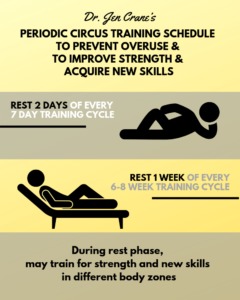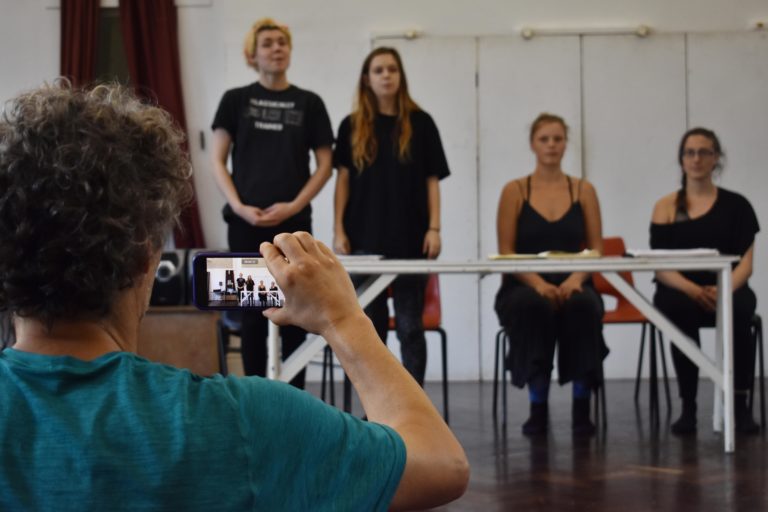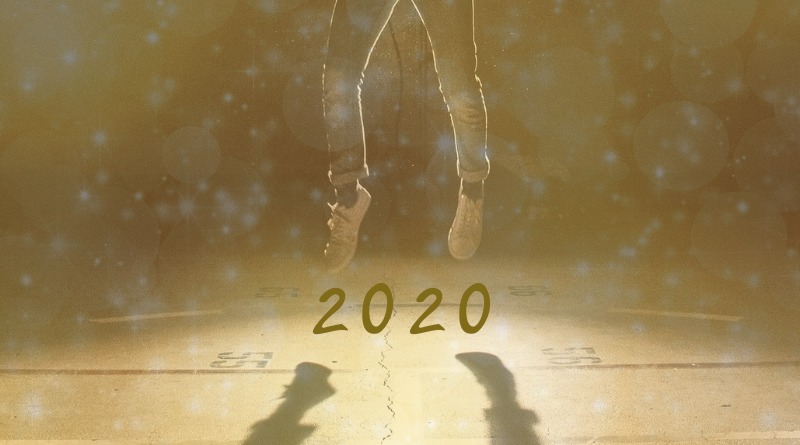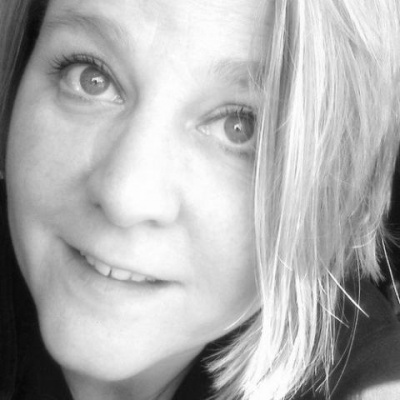New Year, New You? 5 New Year’s Resolutions for the Circus Artist
“You are never too old to set another goal, or to dream a new dream.”
― C.S. Lewis
Making New Year’s Resolutions can be a challenge. Some regard it as a fruitless task and note that will power quickly fades. Others look at it as a time-honored ritual and a way to take stock of the past year and consider goals for the future. But for circus artists, will power is the fuel that feeds the fire, and in the circus world, we face seemingly insurmountable challenges every day, from mastering a dive drop on the silks to finding a residency in the spring so your circus show can move into creation mode.
In a world that doesn’t fully recognize circus as an art form, the obstacles are never in short supply and people in the field have mastered the art of persistence above all else. But if you don’t stop occasionally to take stock of what you have accomplished and hope to accomplish, you might risk losing sight of the joy that brought you to circus in the first place. Circus resolutions for New Years can be a simple way to touch base with your evolving dreams, to recognize your struggles and triumphs, and to help you to focus on progress as an individual, a company or an organization. What resolutions would give you a professional progress boost for the New Year and beyond? Looking back on 2019 at CircusTalk, we have identified a few directions you can explore and more than a few resources to help you meet your goals in 2020.
1. Create a Self-Care Routine

The demands on the body and mind of a circus artist can be intense. You are asked not just to push your body to its limits, but also to be vulnerable on the stage so that the audience can connect with you. This creates a magical performance, but it can also be quite taxing on your energy supplies and can make it harder to sustain your health without the right balance of rest and training. It is no wonder that injuries and mental health problems crop up among artists and athletes so often.
In 2019 at CircusTalk, we made a real effort to address these topics, starting with social media manager Fiona Bradley’s two-part series on mental health,Mental Health & Circus; The Elephant in the Room– Crucial Resources and a Call for Action,and Creating a Mental Health-Conscious Circus Environment; An Interview with Dr. Fleur van Rens. In both articles, Bradley and van Rens discuss practical steps that can be implemented not just by individuals but also in circus studios and schools around the world to educate instructors and students alike about best practices for a circus artists’ mental health. We followed this up with a scientific look at how circus helps brains heal from trauma with Lacy Alana in her article Circus as a Healing Art: What Vagal Theory Teaches Us About Why Circus Works.
On a physical note, we published a thorough article on how to manage pain during training by James Wellington and colleague Daniel Nogueira called The Pain Response–New Ways of Thinking, which explores the science of the pain pathways and what affects them. Editor Kim Campbell delved deep into the topic of training with Cirque Physio’s Dr. Jen Crane in an interview, extracting important training tips, and exploring the tenets of Dr. Crane’s periodic circus training schedule to prevent overuse and to improve strength and acquire new skills.
2. Mix Things Up with Some Professional Development (and Circus Adventures)
It is easy to get stuck in a professional rut and not even realize it. You probably have set training hours to work on your skills and goals. There is contortion class on Sunday to explore a new discipline, and rehearsal every Tuesday and Friday to build your dream show. But if you don’t mix it up every once in a while, you might start to think that all there is to life is the routine itself and miss out on opportunities for professional growth and connection. Training routines are essential to help you get strong physically and to strengthen skills you need to succeed, but occasional challenges in the form of change and variety are what helps you get strong professionally by exposing you to new ideas and calculated risk.
When was the last time you applied for a residency? How many circus festivals do you attend every year to touch base with what is happening in the industry? Have you ever tried visiting a neighboring circus school to train with a new instructor? Is it time for you to offer intensive workshops to share your own skills? These are the kinds of circus adventures that can augment your experiences and remind you about what you loved about circus in the first place, the freedom and excitement.
But professional development doesn’t stop at physical training. At CircusTalk, we dig around for the professional enrichment topics (hint, administrative) that most performers could stand to level up in. In 2019, we asked the question, “Do You Really Need a Circus Agent?” by interviewing two agents,Daniel Tusia of Applause Entertainment and Alexandre Hourdequin of Talents & Productions and comparing their advice. Madeline Hoak visited APAP to report on the advice of agents with her article Steal From an Artist with an Agent: Advice from APAP Pros on Artist Representation. Then Karin McKie plumbed the depths of the insurance world with the article With A Net: Insurance for the Circus Arts. Montreal agent Vincent Messager shared his contract signing wisdom with Negotiating an Artist Contract, a Complicated But an Essential Skill. Lastly, Nadia Jade filled us in on playing the long game at fringe festivals with Hot Hints and Tips to Survive (and Thrive!) at Fringe.
3. Get Outside of Your Comfort Zone (and Learn New Things)

Developing your professional side can be time-consuming and should be tailored to your specific needs, but motivation and inspiration can come from anywhere. CircusTalk has done its best to find inspirational coaches, trailblazing artists and informed ambassadors to share their experiences and expertise, like in this article by Liam Bradley on Jonathan Lardillier’s new juggling notation system, or this article from Ben Collis about how to take a show from a plan to a premiere detailing his journey in the creation process with Bloom at Cirkus Cirkör.
Another way to get out of your comfort zone is to explore related arts or training as a way to augment your skillset as a circus performer (Six Benefits of Cross-Training for Circus Artists & Students), to prepare for retirement or a career change, or just for a creative change of pace (Book Kennison’s Why Do Circus Artists Make Music?is an especially inspiring read.)

Recognizing artists who get out of their comfort zones regularly to take artistic risk is part of CircusTalk’s mission to share the diversity of the circus world with readers. We found inspiration through the triumphant moments of artists who have struggled and succeeded, as in this interview with Marco Motta. We highlight the voices of writers/artistswho question the status quo in society and the circus world with their thought-provoking articles like Zoe Zou Stasko’s Go Beyond the Stereotype: A Thoughtful Discussion Regarding Gender, Binaries, and Contemporary Circus and Nicki Miller‘s Saying No in a Culture of Yes: Artists Building a Code of Ethics in the #MeToo Era.
These forward thinkers prove that it’s up to you to investigate that circus school, to broaden the circus world’s reach, to get your applications in on time (check out this article on how to ace circus school applications by community coordinator Sierra Rhoades Nicholls) or to create your show and take it on tour. Maybe you want to join the world of circademics while you are at it and deepen your research into circus history and current trends–in which case you should visit the CircusTalk News RESEARCH articles page–it is full of articles curated by academic Alisan Funk in 2019. Or dive right into your research with a visit to the article Rejoice in the Circus Libraries of the World for endless resources.
It’s much easier if you have a plan, and we hope these examples of your fellow artists leaving their comfort zones are just the inspiration you need to make your 2020 plan achievable.
4. Set Artistic Goals

Want to keep circus alive in 2020? It might help to set some artistic goals and to dive deeper into art in general. You can go to the theater for research, take a costume designing workshop, sign up for a new circus class, see genre-pushing festivals and shows, hire a dramaturg or a set designer (both can be found with a simple search on CircusTalk Who’s Who or in EXPLORE using keywords). Plan your new act or show, or set a goal to track your progress weekly in an area of growth you want to explore. Maybe you want to reach a wider audience and vow to grow your social media following, or maybe you want to expand your job title and become a circus director. Perhaps one of the most artistic things you can do in 2020 is to get back in touch with your discipline as Anthony Trahair (Pearls of Juggling) advocates in his article Juggling and Playfulness: Wasn’t Juggling Supposed to Be Fun?
5. Set Work Goals (Find Your Dream Job, Work on Your Personal Brand)
Like most jobs, the key to improving your work experience in circus can only be accomplished once you set your intention and start working toward it. But we sometimes forget to reevaluate our direction every so often and to check in with our progress on a regular basis. Maybe you graduated from circus school a year ago and haven’t assessed where you are at or if your goals have changed since you have been in the workforce. Or perhaps you never got around to completing your website, in which case you should readThe Benefits of Owning a Domain Name as a Circus Artist by Ghislain Malardier. In fact, we think the idea of honing your personal brand is such an important topic for circus artists that we made it part of our company goal to lead workshops on it, which we did in Madrid at FIRCO this past October where we were in attendance to be part of the jury, and to present the innaugural CircusTalk Critic’s Choice Award to the aforementioned Marco Motta.
You may have been taking corporate gigs and performing in the same annual show for years without looking for what else is even out there in the job field. The JOBS database is a good place to begin your exploration, as it is rich with current local and international job opportunities. If you are new to it, read 7 Simple Steps on How to Find a Circus Job & Make the Most of Your Profile on CircusTalk to get you up to date.
The beginning of every New Year is always the best time to give another chance to your neglected talents! ― Mehmet Murat Ildan
We recently checked in with the developments of Back Pocket, a young company that is well versed in goal setting. When CircusTalk met with them back in 2017, Back Pocket was an emerging company dreaming of developing their show and an eventual tour in 2019. They used their time together during short term gigs to plan for the coming years: show creation in Belgium, premiere in September of that year, then touring France, Belgium and Italy afterward with the help of Les Halles de Schaerbeek. Their long term plan involved bringing the show back to the US for a tour and eventually to start a US circus festival.

It is two years later and they have performed their show La Vrille du Chat over 65 times around Europe and participated in the Festival in Avignon. They won an award for “Best Circus Show of 2019” by the Maeterlinck Critics Prize in Brussels, Belgium. What they have accomplished so quickly is admirable, but Back Pocket co-founding member Maya Kesselman recognizes the obstacles they continue to face “As a developing company in Europe, it has been a challenge to find a pathway into the North American scene. However, we always have our eyes and ears open for budding opportunities, and keep dreams of creating an American Circus Festival in San Francisco close to our hearts.” She acknowledges that circumstances, however fortunate, have led them to adapt, “Learning how to work as a company with 5 co-founders is a real learning process. How to delegate work, make company decisions, and all the while putting on a circus show (that we are all 5 a part of) has been a unique challenge and a great opportunity for growth. Back Pocket has been lucky enough to have learned a lot since 2017, and we look to the future for many new exciting projects.”
As Back Pocket demonstrated, the dream to tour your own show requires some insights and organization. Thankfully, Fiona Bradley sat in with a panel that programs international shows regularly and distilled their advice for us with the article How to Make a Show That Walks the Walk –An International Touring Talk Panel.
Entering a new decade in the art field of circus is an exciting venture for all of us. Although it might feel arbitrary, using this marker in time as a reminder to assess progress, to reevaluate dreams, to celebrate successes and to grow as a creator is an essential move for anyone in the arts. May 2020 be a year of insight and progress to you and your success!
Feature photo source: Pixabay...
Do you have a story to share? Submit your news story, article or press release.



